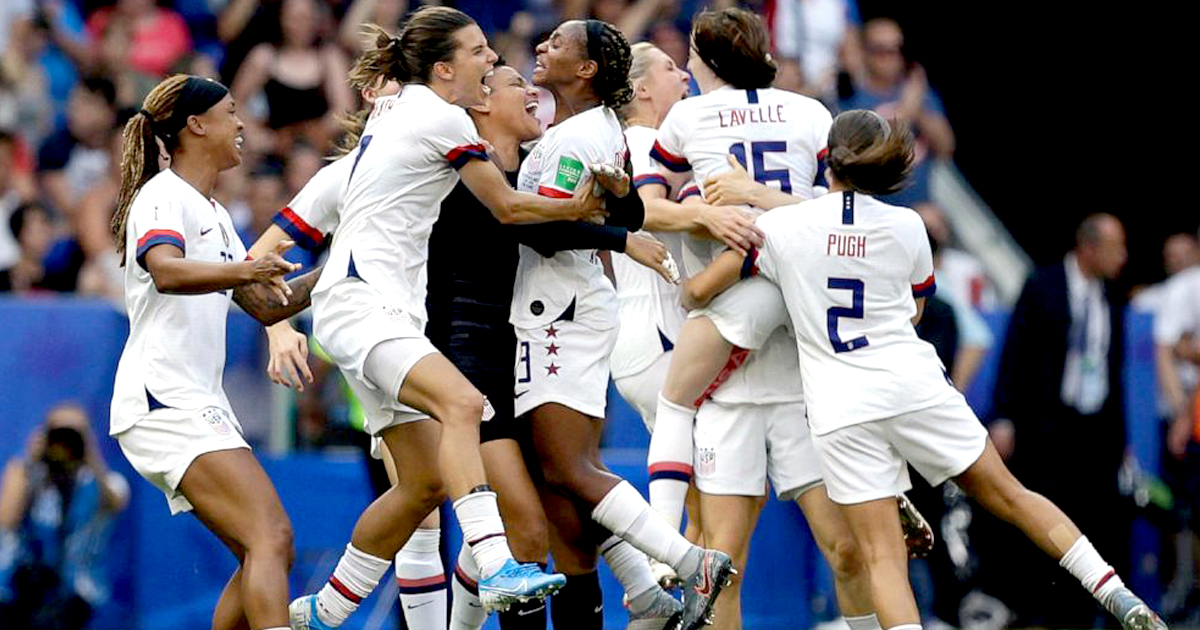U.S. Women’s World Cup Win Puts Need for Fair Pay Policies Back Into Discussion
The U.S. Women’s World Cup win has put the need for fair pay policies back into discussion. Of course, the usual arguments against this concept are also in play, with the idea that pay differentials are tied to differing commercial values between men’s and women’s sports and that there are different pay structures for performing different work. It remains to be seen whether the U.S. Women’s National Soccer Team will be successful in their gender discrimination suit against the U.S. Soccer Federation.
Pay equity is a priority issue for the Women’s Fund of Rhode Island, especially for low income women and their families, and particularly for women of color. The wage gap is a persistent challenge across our nation which worsens for women of color. Studies done by the Association of American University Women and National Bureau of Economic Research, suggests that up to 38 percent of the gap is unexplained and likely outright pay discrimination. While recognizing that some of the gap is due to occupational segregation and family care choices, their research shows that pay disparities appear as soon as women and men begin their careers. Women make less in the same role as men right out of the gate, when caregiving responsibilities haven’t even started.
Less well recognized is the gender wealth gap. Forty percent of women are the sole breadwinners for their families. As a result of lost wages and more caregiving commitments, women are often forced to take on debt, with median debt being 177 percent that of men. This results in less money to support families and save for their own retirement. If we do nothing to address the wage gap, it is not expected to close until at least 2058; the resulting wealth gap will take even longer to close.
Historically, jobs have been qualified as “men’s” or “women’s” work, with men being compensated more in earlier days because they were assumed to be the family breadwinners. Today’s market pay often reflects past discriminatory practices, even though many jobs are substantially similar in nature. While the Equal Pay Act of 1963 made it a federal requirement to provide equal pay for equal work, the courts have narrowly interpreted this to mean everything must be identical in order to claim pay discrimination. In some court cases, the difference of one word in a job description meant the employer was not liable for discriminatory pay.
Can we afford to wait decades to make needed change? We think not! Women’s Fund of Rhode Island, in collaboration with local and national groups, is working to pass legislation that would instead pay women equally for comparable work.
Comparable work as “viewed as a composite of skill, effort, and responsibility, and performed under similar working conditions,” and granting employers the ability to pay differently based on the following exceptions:
seniority (which does not include time off due to family care leave)
a merit system
job performance
differing education levels (when the education level is pertinent to the job role)
bona fide factors that impact the business (and can be construed as working overnight shifts, requiring significant travel, or certifications related to the job)
This year, 39 states are considering fair pay bills. Nationally, the Paycheck Fairness Act (H.R.7) has passed in the U.S. House of Representatives but has not yet been passed by the Senate. It should be an easy win with little or no impact to the businesses already doing the right thing. It will, however, have a huge impact for women overall.
Working women can’t end pay discrimination on their own — and they shouldn’t have to. Weak remedies for pay discrimination mean employers can gamble that they won’t get caught. Suing your employer is not a decision most employees take lightly (nor is it inexpensive), so the argument of “frivolous lawsuits” happening is a red herring. Indeed, states where this legislative language is already in place have not found frivolous lawsuits to be a result.
In the end, fair pay legislation will result in a better business climate. Employers will have quality, happy employees less likely to “turn over” for better paying jobs. The economy will prosper because there will be more disposable income to share. And our community will be stronger because women will be better able to take care of their families. The Women’s Fund of Rhode Island encourages those who support the idea of fair pay to reach out to their local representatives and state Senators to bring this issue to the floor for a vote.
Want to help move the needle on gender equality issues in the workplace? Visit Gender Equality Funds and apply a gender lens to nearly 5,000 of the most commonly-held U.S. mutual funds. Gender Equality Funds enables investors to align their investment with their values. It reveals which mutual funds are investing in the companies that lead the field in terms of gender balance and equality. Investors can easily search the Gender Equality Funds database to see how specific funds are scored, find responsible options that track leading companies in terms of gender equality, and compare financial returns. Sign up here for updates on Gender Equality Funds.
Kelly Nevins is executive director of the Women’s Fund of Rhode Island whose mission is to invest in women and girls through research, advocacy, grant making, and strategic partnerships designed to advance gender equity through systemic change. Nevins serves as a member of the Providence Mayor’s Equal Pay Task Force, Closing the Women’s Wealth Gap Coalition, and the Fight for $15/Fair Pay Coalition.

